Vintage Trouble - Interview
by Lisa Torem
published: 23 / 10 / 2015
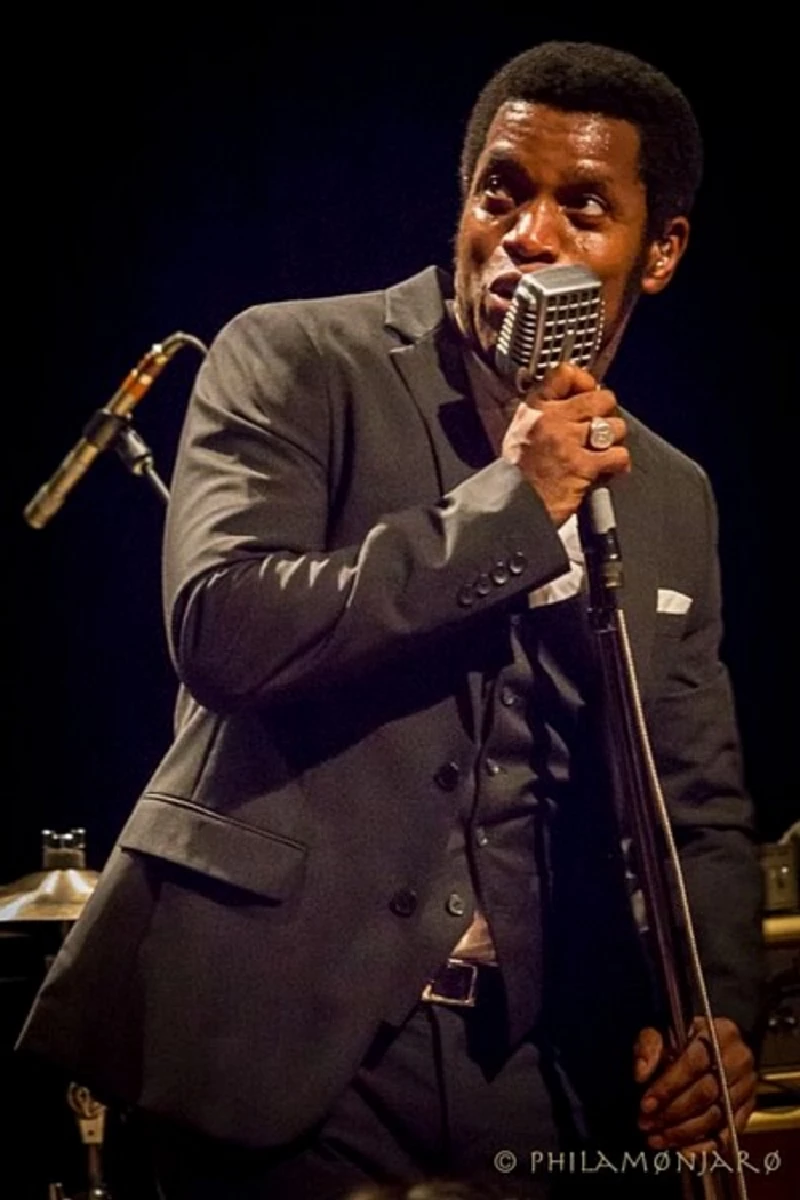
intro
Ty Taylor, lead vocalist of Vintage Trouble, speaks to Lisa Torem about mosh pit safety, working with Don Was on their recently released second album ‘1 Hopeful Rd.’ and singing with Joss Stone
Somehow I was lucky enough to pin down Vintage Trouble’s phenomenal vocalist/co-songwriter, Ty Taylor, for a tour bus chat. The band is currently supporting AC/DC, whilst promoting their second album, ‘1 Hopeful Rd.’ (Blue Note Records) which follows up ‘The Bomb Shelter Sessions‘. In only five years, Vintage Trouble can boast opening for The Who, The Rolling Stones, Willie Nelson and performing in some of the world's most legendary venues. Ty is an animated man who lives to communicate He originates from America’s east coast, but met his band mates in the Venice Beach area near Santa Monica, California. An average week might consist of chatting to a syndicated talk show host, leaping off a riser at one of Vintage Trouble’s headline shows, searching out the local scene from a city cabbie or slipping away into a corner, deep in thought, constructing a soulful ballad with lyrics designed to melt your heart. It’s easy to understand why their international fans, the Troublemakers, can’t get enough of them. You might consider Ty an old school performer with a contemporary vision. Because of his Heaven-scent voice, he has drawn comparisons to James Brown and Sam Cooke, although as you will see as you read on, Ty has his own ideas about whom he is. And speaking of visual image, Ty and Vintage Trouble are 3-D showmen in every sense of the world, each communicating with the audience in a unique way. Rick Barrio Dill looks totally chilled as he pumps out those gyrating bass lines. Nalle Colt shreds a bright rockabilly passage that culminates into a smokin’ blues, still finding time to press a personalized, porcelain pick into the palm of an adoring Troublemaker. Richard Danielson pulls it all together with his unbelievable rhythmic penchant. Just add high-draped pants and winklepeckers and you’ve got Vintage Trouble! And Ty keeps those international Troublemakers enraptured by cruising across the stage like a ballroom dancer on Red Bull, serving up a falsetto light as a soufflé and putting his life on the line with every silky tone. He’s a peacemaker, heartbreaker and songwriter extraordinaire — Pennyblackmusic presents Ty Taylor. TY: We’re on a bus right now travelling from Toronto to Minneapolis. Last night we did an AC/DC show and we’re heading into one of our headline shows. Usually when people ask me how I’m doing these days, I say, “I’m on top of the world looking down on creation, it’s the only explanation I can find,” and it’s so funny to see what people know what I’m talking about and the people who don’t. (Laughs) So many people just think I’m serious. Oh my God, that’s so poetic. So let me tell you before you write that down as a quote of mine…A lot of times, especially these days in music, you’re not able to get away with that kind of pure honesty and that kind of happy poetry. That was one of the biggest songs in pop radio and now you can’t get away with it. But I love the sentiment of it and that’s exactly how I feel. PB: Ty I just saw a video of you being thrown into a mosh pit and wanted to know if you’d recommend that experience to others. TT: (Laughs). Completely. So many people including my family are worried about the safety of it and everything but, first of all, I dive forward and more so than crowd surfing I crowd swim. I’m on my stomach and there’s no danger in it as long as your head doesn’t hurt somebody’s shoulders in front of you and also what I really like about it is that it actually goes beyond just speaking a phrase, I literally count on them as part of the show, because with out them supporting me during that time it would not go down well, so by trusting people, and you can see their faces, people running up to you wanting to be a part of that whole moment, and I guess now, because reputation is preceding it a little bit, I can tell once ‘Run like the River’ starts, people start running towards where they think I’m going to jump. It’s exciting. I would recommend it to anyone who feels like they know what body control is, I wouldn’t recommend it to somebody who doesn’t know about weight distribution because you could get hurt. PB: Congratulations on ‘1 Hopeful Rd.’ Your mum was a major inspiration. TT: Everything I do is inspired by my mom. When I was a kid, I lucked out. We were watching ‘La Bamba’ on the bus and Ritchie (Ritchie Valens) said something to his mom about making the band, and in a working class family the last thing a mother wants to hear is about some kid getting into a rock band, but right away from the beginning my mom always let me know that, if I believed that’s what I was supposed to do, she was fully behind me. She nurtured me in a way that always made me, first of all, want to do better, and told me that if this was the choice that I made that I had to take responsibility and try to be the best I could be at it and, as long as she knew I was doing my best, she would support it. And it wasn’t until I was an adult that I realized that everyone is not told that as a kid and you could kind of see it in people's eyes if you walk around from place to place and street to street, and so I thought it would be cool if in my lifetime I write as many songs as I can that help people realize that to be a good guy is powerful. People consider it sexy to be a bad guy but I’m on a mission to make happy the new cool and positive the new cool and make inspiration the new cool feeling. A lot of people walk around in the world not having enough songs like ‘Run Like The River’ that pump peoples’ souls up. In ‘1 Hopeful Rd.,’ the first line in ‘Run like the River’ talks about your road, no matter how treacherous, how bumpy, how dark, how seemingly hopeless it is, as long as you keep believing in something, whatever it is, even if it’s just yourself, whatever you believe, whether it’s the universe, God or Buddha, if there is just something in front of you that lets you know that it will always be better, it’s going to get better. PB: During our previous interview, you defined soul as “wordless emotion.” Does that definition still apply? TT: Yes, but I’ve gone through some time and I’ve figured out a little more than that since that time. I was connecting it to the idea that usually when people sing it’s because the spoken word is not good enough and so now I would describe soul as probably the rawest indicator of who we are, so, for me, if I’m the soul singer, the more soul and pure soul, not something I just learned in singing coming up, the more uninhibited, raw, primitive soul I can put into each performance, the more it allows me to connect to what I think is the best parts of me and when it comes out I feel like I’m demonstrating the best parts of me and if I can really dig deep than I can demonstrate the best part of it all. There are so many people that think with their heads sometimes and although we need that for really important things that advance us, we also need our soul to advance and I think that not enough people deal with igniting their soul on a constant basis. Everyone goes to the gym, everyone studies concepts but how many people try to make some kind of soul inspiration part of their regular everyday go about? I wish I could meditate. My mind moves too fast to allow me to slow down and there’s music and other ways, but I just wish that everyone could find some way to make sure their spirits are taken care of while they’re taking care of everything else. I have friends who meditate and God bless them; I wish I could figure out how to do it. Luckily I don’t have to because I’m on stage but some people put it in there at work or maybe on my way home I’d meditate or I’d do yoga or I’d make sure I have a moment of silence. PB: Let’s talk about performance. You show great restraint on stage. I’m on the edge of my chair when I see you sing, because I don’t know when you’re going to build to that crescendo. TT: Do you feel that I let the restraint go? PB: Yes. TT: I thought you were going to say, "When are you going to let it go?" (Laughs). PB: Sometimes a singer will give away everything he’s got at the beginning of a performance and out in the audience we’re thinking, "Hey, save something for me." TT: It’s funny because just because I run around a lot people line me up with James Brown and stuff like that. I’m really a bigger fan of a lot of the 1950's and 1960's crooners like Sam Cooke and Little Willie John and early Etta James, people for whom melody is important and. although restraint has to do with it, a lot of it has to do with the story that you’re telling. There was a point in my life when I had a Mohawk. I would do a lot of extraneous vocal acrobatics like that but to me that’s the outside working inward. Now I just like to work on the inside. What that means to me is getting rid of as many as possible extraneous parts of the performance and getting to the core of the storytelling, like a movie or a book, the climax has to happen somewhere and if you explode before that climax then you’ve ruined what is to be the climax. There’s no reason to get to the end of the song if the second the song drops, you’ve got to hear something crazy But it’s not only that. There are songs that do that, but then they’re done for a certain reason. For example, Michael Jackson, as a kid, sang ‘Still Loving You’- it’s big right away, but then it pulls back. There’s that kind of thing. You let it go and you let people know what it’s going to be and if you take it away then the refrain starts going back to that and it’s cool as well, but as long as you don’t let it build the whole time, because then it gets boring. You’re almost short changing yourself. PB: I saw a clip of you with Joss Stone and it was clear that you were deeply engrossed in the moment. TT: One of my favorite places to play is the Royal Albert Hall. I have a lot of friends that are powerful entertainers. They say that in my performances with other people that I focus more on other people than myself, which is great for me because that’s kind of how I want to live my life. I’d rather be a listener than a speaker. It’s nice to get yourself in the moment of it and really concentrate on what they’re doing. With Joss Stone, first of all, I want to be respectful. I don’t want to try and do anything that would make it seem like I didn’t understand how lucky I was at that time to be on stage with her, so I’m just really trying to follow where she’s going and support what it is and dance in between it. I’m not going to try to out sing her — I want to tell the story. So part of the restraint is that and also there is the performer falling in love thing. It’s not like we spend a lot of rehearsal together. We just rehearsed at sound check and got together that night. So literally in that moment I’m falling in love. Literally. And I don’t want to do anything that might fuck up the relationship with her in that three-and-a half minutes (Laughs). So there’s the foreplay involved, the conversation involved and for me, being man to woman, I want there to be chivalry. I want to open the door for her and pull the chair out for her performance-wise. I don’t want her to ever feel like she’s not taken care of. I don’t want her to ever feel that she’s not supported and I want her to be able to look in the eyes of someone with a really good reflection. When we’re singing and when she looks into my eyes I want her to feel like she’s the most beautiful and the best performer and I want her to feel that she’s being the most effective that she could ever be to somebody and so when that’s going on, that’s what I’m doing. I trust my skill set enough to know that it’s going to back me up so I don’t have to worry about what I’m going to sing, I just have to concentrate more on releasing and giving and supporting it. PB: Is the song ‘Doin’ What You Were Doin’ supposed to take us back to a specific musical era? TT: Let me hear what you would say first. PB: I’m thinking 1950s. TT: Some people say it reminds them of ‘What’s Going On?’ by Marvin Gaye from the ‘70s. It’s somewhere in between those for me. Style wise, when I brought the song into the guys, it’s more about a feeling and the style just allowed itself to be megaphoned through the feeling. I was on a beach one day with a friend and a big fight had broken out. The cop who broke up the fight said, "Everybody get back to doing what you’re doing." So that’s where the chorus came from. We started thinking about those moments in all of our lives where there is so much friction and it’s almost like rubbing two sticks together and the fire is about to start and then as soon as the burst happened, the breath, the du monde, when everybody just walks back down into being cool and everyone can relate to that, whether it’s a husband and wife, a kid and his parents, that fire happens and then you get back to doing what you’re doing. And at the time I was on Venice Beach and, oddly enough, it was almost sunset and I equated that expression, "Everybody, get back to everybody doing what you’re doing" with the sunset. We’re right above the water; the red sun right before it seeps down, the vibration is so alive and the light almost explodes as a visual image and then sinks and then the air gets cooler and the universe gets back to doing what you’re doing. So just that overall feeling is what I wanted to bring musically to the song. I was thinking, "What makes me feel so relaxed?" And here’s the thing. I wanted it to feel as groovy and relaxing and spiritual and melodic as a good Bob Marley song. And even when I heard it in my head as I was writing it, if I heard anything, I heard it as a reggae song originally. We went to Island Records and Island Records is Bob Marley. When we went there, one of the women that was really high up, said to me, and that was a huge compliment, that our album reminded her of ‘Late Spring,’ one of the Bob Marley albums. That was the biggest compliment because I didn’t know if anyone could hear it from the outside. PB: So you’re like a magnet. You walk down the street and pick up what people are saying and some of that discourse ends right up in your songs. TT: I just saw my friend, Tara Slone, a big on-air personality in Toronto and when I was leaving, we were both emotional about it and after we separated I texted a message to her: “You’re still on me, lingering” and then I thought, (sings) “When you are gone, you are still on me, lingering.” PB: That’s so musical. TT: I just thought of that expression, lingering. We all know it, but we don’t talk about it often. Sometimes it’s things brought about by other people or things from the band. Whatever it is, we just keep ourselves open in order to hear the things that are thrown at us musically because, in general, it shouldn’t just be musical, it should be about us as people. And if we’re too set on what is supposed to be, we don’t get to what is supposed to be (Laughs). TT: ‘Shows What You Know’ is a love song in such an odd way but it’s such a triumphant way and it’s what we’re talking about, when someone thinks the relationship is supposed to be over because of that time when the relationship is supposed to be over, but in reality we’re actually good right now. So just let that go and the whole expression, ‘Shows What You Know’ — usually it’s a bad thing, instead it’s like looking to get back together. They thought they knew, but they didn’t know. PB: Where would you place ‘Pushing the Pelvis’ on the Vintage Trouble continuum? TT: It’s the same end-all mission as in everything else. It’s the less educated idea about the same thing. Some songs are about the ideas of the mind and it’s about having fun and moving your body around a little bit. It’s going to solve the problem, answer everything for you. Stop trying to work it out and dance and see what kind of answers come to you. We can try to over think things. Most of the time we do over think. We can go read less self-help books and less long lectures and just make your body feel good. See what it does for your head. PB: What was it like working with producer Don Was on the new album? TT: Don Was is an amazing Buddha genius. It could not have been any better. His ears are so finely tuned, so there’s a technical aspect to him. He knows exactly what’s not happening as far as the groove of the band and what’s not serving the song, but more so, I talked about the Joss Stone thing. He could just look at you and something about the way he looks at you makes you become the best you because it’s without judgment. It’s with inspiration and support. He looks at you like you are one of the best musicians in the world; like the world is counting on you and it just makes you do your best work. He doesn’t tell you when a song is good. You can tell by his body language if a song is good or not. Once you see him relax and start dancing and then you see him drop his hat and he brings his fingers in the air and starts snapping. And when all that happens then you know that something really nice is going on. And it might not be the right thing for everybody, but for everyone in the room and him the right thing is happening. PB: How did you find time to write with such constant touring? TT: I can’t stop writing. The writing is happening while we’re on the bus right now. It’s happening when I go to church. It always happens. Whenever we’re together, there are four minds that are always hearing a lot of music and, for us, the touring actually slowed down the second album from happening, but I’m glad that it did. By the time we got to the studio, it was just spewing out. What a lot of people don’t talk about is that a lot of better songs don’t make the record, because maybe at some point for some reason during the recording process, the best songs don’t become the best records because of how you were recording that day. There are about thirty songs still that we love that didn’t make the record that maybe presentation wise we didn’t nail on the head. There’s always an abundance of music luckily and we try to write and record a lot and put it in the bank in case there is one of those times that that abundance is slowing, we have songs we can grab from. PB: So are you planning another album soon? TT: I hope so. Granted we’ll probably be touring a lot. But we already have an album of material ready that didn’t make the album. So, yes, I want to put out more records more often and not necessarily rely on traditional album cycles. Sometimes it might be overwhelming for fans. PB: We can handle it. TT: But you almost want to make sure that people really get to know a pool of material. I guess the answer is that all of it is right. PB: So how’s the touring going? TT: It’s amazing. We’ve toured with Lenny Kravitz, Joss Stone and the Stones. This is the biggest tour in the world and during each show we try to make sure we connect with our audience — we want as many people as possible to feel that they had a personal spark from us during that show. So the difference between this show and the other shows is that there are more people to reach during each performance. The body vibrates faster. We went to so many more cultural events and saw more museums and saw more locals. We went to not just the best restaurants but we went to the neighborhood restaurants. You start to hone in on what tour life can be about and it’s not just the shows. A lot of people don’t get to travel. I realize that travel is a luxury. The cool thing about touring this album is that we’ve been trying to get the most out of it and trying to be the voice for people that may not get to ever travel. So even as a part of our social networking, we talk not just about the shows, but about the people in the places. As a touring musician, you realize that you’re seeing the world for people, not just for yourself and it’s kind of selfish to think that it’s all in the studio, enclosed. Literally there are people at desks, relying on you to see the world for them, to hear what the world is like. PB: When did you realize that your voice moved people? TT: When I was five, I sang in the choir. I got to sing a verse in ‘Kumbayah.’ I sang, "Do you hear me Lord? Come by here." When I started singing, people in the church started crying. A five-year-old would probably panic and think, "Why are people crying?" But for some reason I started crying while I was singing. I lucked out, being one of the people that at an early age in his life knows what he’s going to do for the rest of his life. PB: There’s a real beauty in ‘Kumbayah.’ Vintage Trouble captures that quality, too. TT: I especially wanted to do that with ‘Soul Serenity.’ There are not enough songs in the world that talk about the simple things and being heard and being felt. I’m in love with the idea of being around a campfire and singing some songs. Nalle plays acoustic guitar, but the bass feels likes it’s a Stax song and Richard plays on brushes the whole time. We even did a round on conga. We wanted something so simple, like a blanket on the agitated soul to calm people down. My sister lives on the East coast and I live on the West and says she listens to that song when she wants to have a conversation with me. PB: Thank you. Photographs by Philamojaro http://www.philamonjaro.com/
Band Links:-
https://www.facebook.com/vintagetroublehttp://www.vintagetrouble.com/
https://twitter.com/vintagetrouble
https://www.youtube.com/user/vintagetrouble
Picture Gallery:-
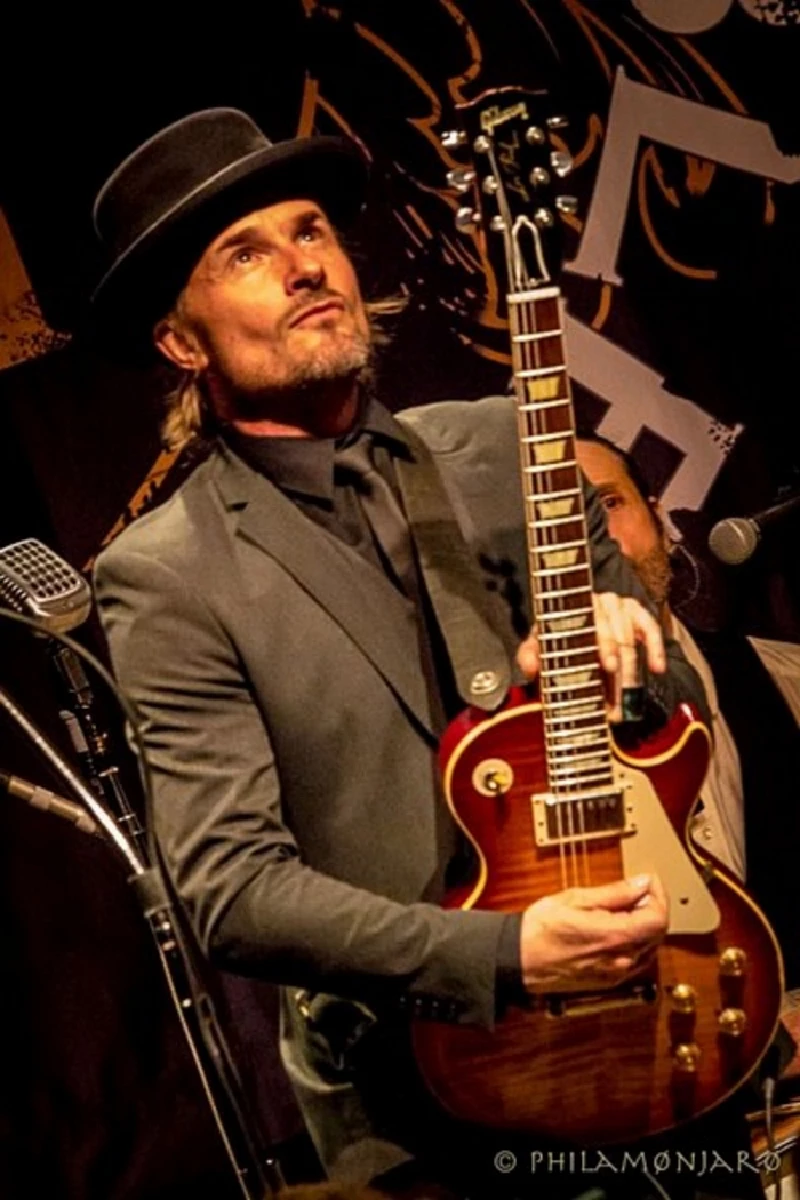
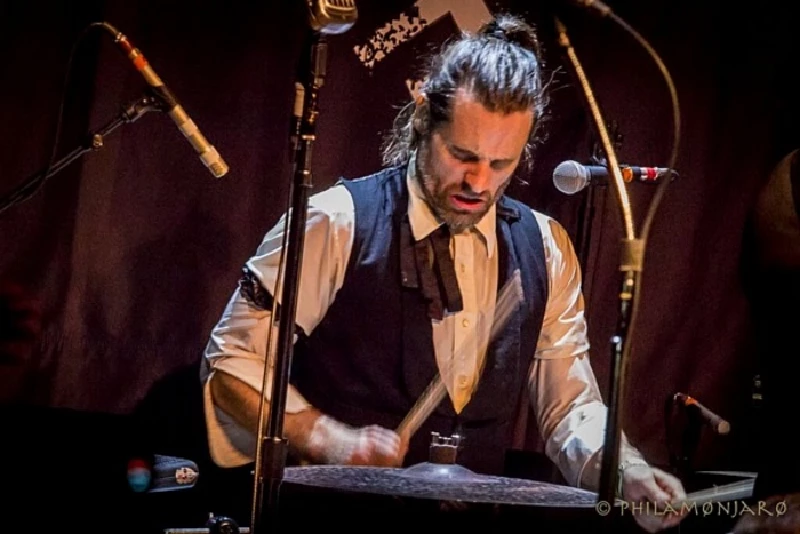
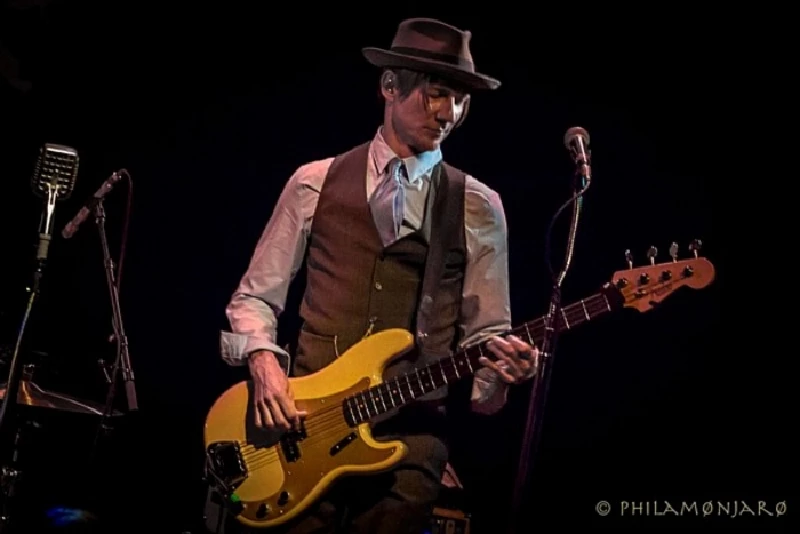
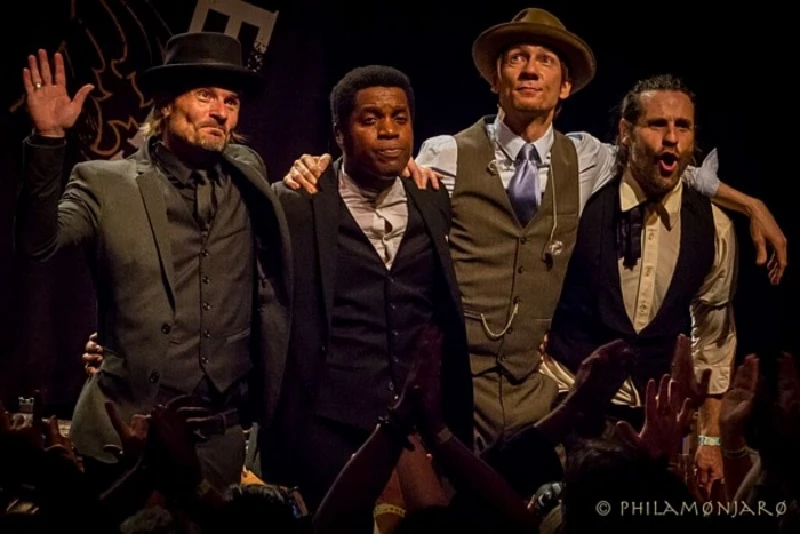
interviews |
|
Interview (2012) |
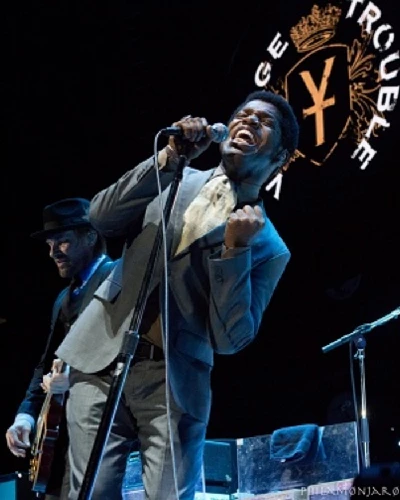
|
| Lisa Torem speaks to bassist Rick Barrio Dill and vocalist Ty Taylor from retro-influenced band Vintage Trouble about their debut album, ‘The Bomb Shelter Sessions’, and recent tour in support of the Who |
live reviews |
|
Troubadour, Los Angeles, 15/11/2018 |
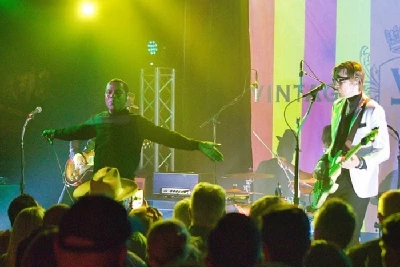
|
| L. Paul Mann watches retro-influenced act Vintage Trouble rock the Troubadour in Los Angeles. |
| Academy 2, Manchester, 1/4/2015 |
soundcloud
most viewed articles
current edition
Spear Of Destiny - InterviewRobert Forster - Interview
Fiona Hutchings - Interview
When Rivers Meet - Waterfront, Norwich, 29/5/2025
Carl Ewens - David Bowie 1964 to 1982 On Track: Every Album, Every Song
Brian Wilson - Ten Songs That Made Me Love...
Pistol Daisys - Waterfront, Norwich, 29/5/2025
Gary Numan - Berserker
Deb Googe and Cara Tivey - Interview
Roberta Flack - 1937 - 2025
previous editions
Heavenly - P.U.N.K. Girl EPBoomtown Rats - Ten Songs That Made Me Love....
Dwina Gibb - Interview
Trudie Myerscough-Harris - Interview
Oasis - Oasis, Earl's Court, London, 1995
Sound - Interview with Bi Marshall Part 1
Susie Hug - Interview
Chuck Prophet - Ten Songs That Made Me Love...
Ray Humphries - Interview
Sukie Smith - Interview
most viewed reviews
current edition
Peter Doolan - I Am a Tree Rooted to the Spot and a Snake Moves Around Me,in a CircleGarbage - Let All That We Imagine Be The Light
Little Simz - Lotus
Suzanne Vega - Flying With Angels
John McKay - Sixes and #Sevens
Vultures - Liz Kershaw Session 16.06.88
Billy Nomates - Metalhorse
HAIM - I Quit
Vinny Peculiar - Things Too Long Left Unsaid
Morcheeba - Escape The Chaos
Pennyblackmusic Regular Contributors
Adrian Janes
Amanda J. Window
Andrew Twambley
Anthony Dhanendran
Benjamin Howarth
Cila Warncke
Daniel Cressey
Darren Aston
Dastardly
Dave Goodwin
Denzil Watson
Dominic B. Simpson
Eoghan Lyng
Fiona Hutchings
Harry Sherriff
Helen Tipping
Jamie Rowland
John Clarkson
Julie Cruickshank
Kimberly Bright
Lisa Torem
Maarten Schiethart